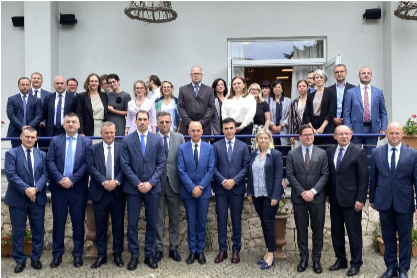At a critical moment for the EU integration process and amid persistent threats from organized crime and corruption, Tirana hosted today the Consultative Forum of Prosecutors General and Special Prosecutors of the Western Balkans. This high-level institutional meeting brought regional cooperation and international support for rule of law back to center stage. Key justice actors and international partners addressed the forum, including Albania’s Prosecutor General Olsjan Çela, SPAK Chief Altin Dumani, Eurojust President Michael Schmid, and EU Ambassador to Albania Silvio Gonzato.
Ambassador Gonzato delivered a clear message: an independent judiciary is not just a domestic necessity, but a fundamental condition for EU membership. He emphasized that organized crime and corruption are no longer national challenges alone—they are common threats that erode public trust and stall both institutional and economic development. “Criminal networks exploit high-level corruption to wield influence and evade justice. That’s why cross-border judicial cooperation and coordinated action are essential,” Gonzato stated. “Strengthening the rule of law and delivering tangible results in this area are prerequisites for EU accession.”
Moreover, SPAK Chief Altin Dumani offered a pragmatic vision for regional cooperation. He noted that success in investigating complex cases directly depends on collaboration with Eurojust and regional partners, especially Kosovo and Montenegro.
“We are not only bound by geography, but also by a shared mission: fighting corruption and organized crime. Joint investigations, information sharing, and mutual trust are essential. Cooperation isn’t a luxury—it’s a necessity,” Dumani declared. He reported 23 joint investigation teams established in the first five months of the year, including one with Latin America—highlighting SPAK’s global reach.
Meanwhile, Prosecutor General Olsjan Çela underscored the need for stronger inter-institutional coordination within Albania. “Our challenge lies not only in the increasingly complex nature of crime but also in the efficiency of our response. Harmonizing investigative actions among our agencies is fundamental to keeping
pace with our international partners,” he said.
This forum comes at a time when many Western Balkan countries stand at a crossroads between reform and institutional stagnation. While political rhetoric around EU integration remains strong, the EU has made it clear: only tangible results in fighting crime and corruption will make the difference. Eurojust President Michael Schmid described the Western Balkans as a strategic partner in the fight against transnational crime. He confirmed that Eurojust would increase its support for the region, providing access to resources, best practices, and expertise to help build more effective and better-coordinated justice systems.
The forum sends a dual political message: to regional governments, that justice cannot be used as a political tool, and to international actors, that support must be matched with pressure for genuine reform. If there is one clear consensus in Tirana today, it’s that effective justice, cross-border cooperation, and institutional independence are no longer optional—they are red lines that will define the region’s European future.
Written by our correspondent A.T.



